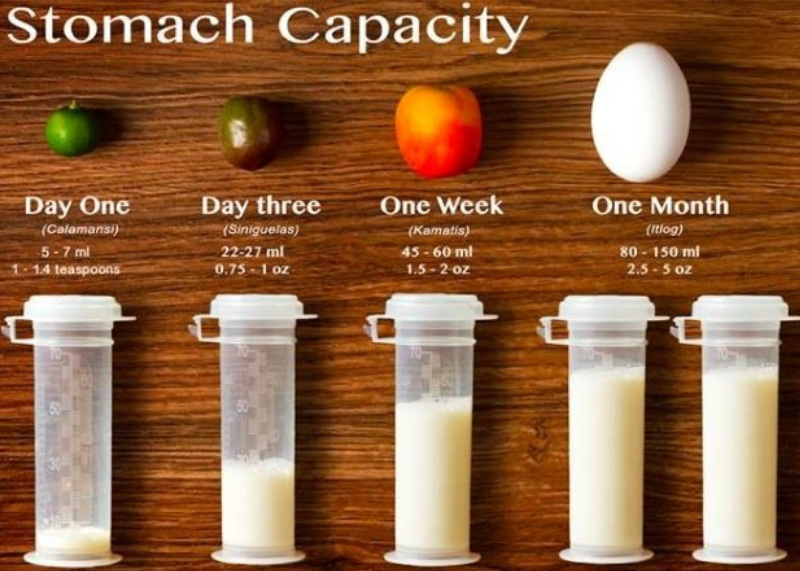Are you wondering how much expressed breastmilk you need to pump for baby? If you’re pumping for a newborn baby, you might be surprised by how small his or her stomach capacity is. Continue reading to find out more about how much milk you need for your baby...
Stomach capacity of the newborn by age
At 1 day old, your newborn baby’s stomach capacity will be just 5-7 mililitres (or 1/2 Tablespoons) so that tiny bit of colostrum you’re producing truly is enough for baby at each feed. During the first day of life, it’s normal for baby to want to sleep for several hours, and then begin cluster feeding (feeding every hour, or more) for the rest of the day and into the next day. This is completely normal and helps
establish your milk supply. Baby is getting just enough colostrum to get his or her digestive system going. If you’re expressing for baby, make sure you’re expressing as often as baby wants to eat – and remember, just a couple mililitres at each feeding is perfect.

At 3 days old, your baby’s stomach capacity will have tripled or quadrupled! Your baby’s stomach capacity will be anywhere from 22-27 mililitres (.75-1 US ounces). Baby is still eating just a small amount though at each feed. You may notice your milk coming in around this point, and it may be a yellowish color as your breasts transition from making colostrum to milk. If your milk is not in yet, that’s completely normal! The colostrum your body is producing is still absolutely enough for baby’s nutritional needs.
At 7 days old your baby’s stomach capacity will have grown again to anywhere from 45-60 mililitres (1.5-2 US ounces). It’s very normal for newborn babies to still be cluster feeding at this point, and it’s normal for new mums to wonder if that means they don’t have enough milk supply. This is your baby’s way of establishing your milk supply, and they’re growing a LOT at this age so they will need to eat a lot. If you haven’t seen breastmilk yet, you should expect to see it by around 7-8 days of age (if there’s no sign of breastmilk by day 8, you should contact your care provider). As your breasts transition from making colostrum to milk, you might feel hard or tender. You can relieve some of this discomfort with your breast pump. If you’re exclusively expressing you should still be pumping as often as baby eats.
At 1 month old your baby’s stomach capacity should be between 80-150 mililitres (2.5-5 US ounces). This is a big range of ‘normal’ and varies depending on the baby, just as hair color and height do. The amount of milk that baby consumes at each feed typically stays the same from 1 month of age until solid foods are introduced (anywhere from 6 months to 1 year of age), and at that point your
baby’s needs may decrease.
Establishing your milk supply (age 2-3 months)
Your milk supply should regulate at about 2-3 months of age, so if you’re still feeling a bit full that is completely normal. New mums sometimes think that because they’re feeling full at this age, that baby isn’t eating enough milk. This is normally not true (unless your baby is showing obvious signs of hunger or not gaining weight), and this is just a normal oversupply that you might experience until your milk supply is established. If you’re exclusively expressing, you should still be expressing as often as baby is eating – or more often – until your supply regulates.
Once your supply regulates, you will likely feel less full, or softer. Many new mums think that means they’re drying up – and it’s absolutely not true! When your milk regulates, you are producing just enough milk for your baby – not more, so you won’t feel full nearly as often (or until baby starts sleeping through the night!).
Colostrum during the first week
In the first few days of life before your milk comes in – and milk typically comes in anywhere in the range of 3-8 days after giving birth – your breasts will be producing colostrum, a clear slick fluid. Colostrum provides all the nutrition your newborn baby needs to fill his or her tiny stomach. Mothers typically start producing colostrum during the final month of pregnancy, and some mamas like to express colostrum ahead of time to give to baby in the birthing suite.
Tips for expressing colostrum
If you’re expressing colostrum with a breast pump, you can expect to get just a teeny tiny amount. In fact, the amount is so small that you might not see any in the bottles at all! After you pump, check in your breastshield for droplets of colostrum, and look in the duck valves too. Use a syringe to suck up the droplets of colostrum, and then feed baby. It may not seem like much, but a couple mililitres is truly all your newborn baby needs in the first days of life.


